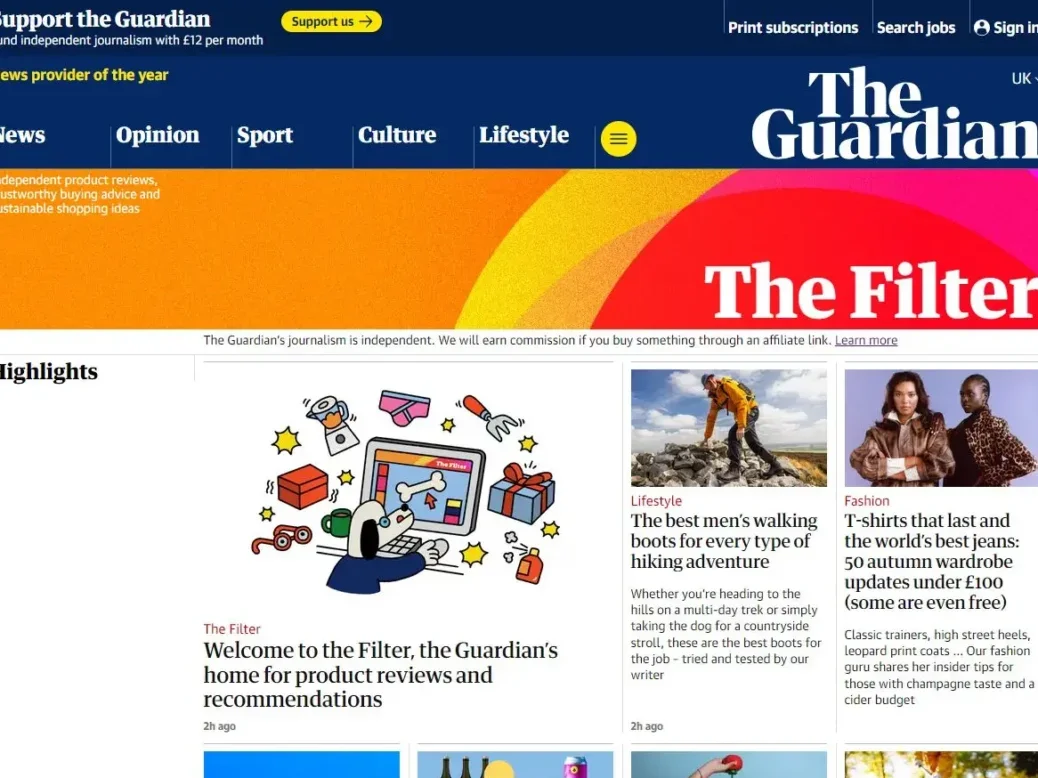
The Guardian has begun publishing product guides featuring links to shopping websites to target a growing business of affiliate revenue.
The news site has formally launched The Filter, a page it describes as providing “independent product reviews, trustworthy buying advice and sustainable shopping ideas”, following a trial lasting several months.
The Guardian said The Filter is a showcase for the best of its consumer journalism and reviews and recommends products completely independently.
It emphasised that all the articles are free to read, are written by writers chosen for their expertise who will research and test products in real-life scenarios, and that no advertiser or retailer can pay to be included.
The Guardian will earn a small commission if someone clicks on a link on one of the pages and goes on to make a purchase or sign up to a service. Like many other publishers, it is using Skimlinks which places a tracking code in links to be used by publishers so purchases can be correctly attributed. It is also using Amazon Associates programme for that site’s links.
Articles on The Filter’s homepage on Thursday included round-ups of men’s walking boots, autumn wardrobe updates for under £100, the best electric cars that aren’t Teslas, subscription services “to save you time and money”, and gardening tools.
Each page features a disclaimer underneath the author byline which reads: “The Guardian’s journalism is independent. We will earn a commission if you buy something through an affiliate link.” It also features a link to The Guardian’s full explainer for readers on affiliate links.
Guardian News and Media chief financial and operating officer Keith Underwood revealed last month that The Guardian would begin making product recommendations, and thus affiliate revenue, “based on the trust that we’ve got within the brand”.
Chief executive Anna Bateson said today: “Building on the Guardian’s trusted brand reputation and deep relationships with our readers, The Filter is a new carefully curated online home offering independent advice for those seeking to buy quality, sustainable products without commercial influence.”
The Guardian joins a stable of publishers that over the past few years have grown their e-commerce/affiliate offerings, including The New York Times with Wirecutter where affiliate grew in Q2, and Mail Online.
The Independent describes e-commerce as one of its five key strategic growth pillars and revealed this week such revenues were up 26% with highlights including Black Friday and travel content.
E-commerce and affiliates are similarly part of a diversification strategy away from a reliance on advertising at Reach, which said these areas are seeing “promising growth”.
However, Future plc said in its half-year results that affiliate products have been “impacted by the wider macroeconomy, through lower demand as seen in the lower audience numbers, as well as a reduction in the average basket size”.
The latest trends and predictions report from the Reuters Institute for the Study of Journalism published in January listed e-commerce as the fifth most important revenue stream for commercial publishers in 2024
E-commerce is generally when sites sell products themselves whereas affiliate is when they promote goods from other retailers and earn a commission on click-throughs, although sometimes the terms are used interchangeably.
The Guardian once had its own online shop, selling its own merchandise including a mug that read: “I’m the one The Daily Mail warned you about”, which closed in 2016. The Guardian does still run an online bookshop.
Last month Guardian Media Group, which is owned by The Scott Trust, reported a fall in revenue for the year to 31 March after a four-year growth streak, and rising losses. On the same day it revealed it is considering a sale of Sunday title The Observer to slow news outfit Tortoise Media. Any profits from The Filter will be reinvested back into The Guardian’s journalism.
Email pged@pressgazette.co.uk to point out mistakes, provide story tips or send in a letter for publication on our "Letters Page" blog
